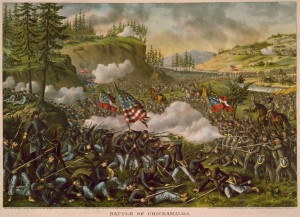Sound and War
Here’s a short piece about sound during wartime Lt. Col. Robert Bateman that was posted today on the Esquire magazine’s politics blog. While the context it quite different from what we talked about today, I think it’s an interesting entry point to thinking about the way that sound comes to take on particular meanings.

The Battle of Chickamauga (1890), lithograph by Kurz and Allison.
Here’s a short quote, but the rest of the post is interesting in talking about the difference between modern warfare and the American civil war:
On any battlefield of the gunpowder age, it is likely that you really cannot see what is happening. There is just too much damned smoke, most of the time, to gauge things visually. This is especially true at a distance. Add in broken terrain and/or woodlands, and the only sense you are left with is sound. But sound can tell you a lot. Experience helps, of course, in interpretation.
From sound alone I could determine what nationality of unit was engaged in a firefight. I could tell who was “winning” and who was “losing” (the quotes reflecting the fungible nature of any short firefight in a city). I could determine if a unit was well disciplined, or not, and if that unit was on the offensive, or defensive. The rate of fire, the volume of fire, the tempo of volleys, all of this builds a mental picture that allows you to understand, if you know what you are listening to, what is going on out of sight from where you are.

This is really fascinating. I wonder if they received any kind of training or informal instruction about how to immerse themselves in an environment where vision is essentially useless. I’m curious to know how they adapted from the vision-centric way of knowing to audio. He was able to deduce information that would have been harder to interpret with sight through listening, like the rate and volume of fire, demonstrating that not only is listening a different way of processing information -- it really opens up a wealth of otherwise altogether inaccessible information.
I am not sure about during the time of the civil war, but a friend of mine is in the Canadian military and he has mentioned that they do training activities where they are only able to use audio sensory to depict their surroundings and get themselves and their fellow troop-mates out. I think it’s really interesting that they do this because of circumstances like in the article above. It kind of reminds us how vital to our lives our sense of hearing is and how we can quite often take it for granted.